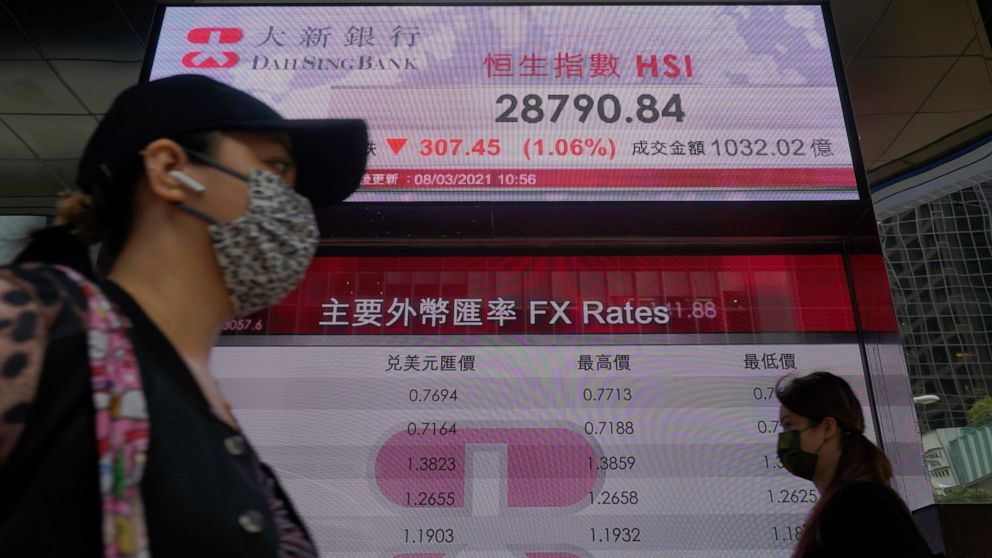Stocks waver early on as tech opens weaker and yields rise
TOKYO — Stocks are wavering between small gains and losses in the early going on Wall Street as weakness in technology companies is offset by strength in banks and other sectors. The S&P 500 was off 0.1% in the first few minutes of trading Monday. Other indexes were mixed. Trading has been choppy in recent weeks as investors fret over a sudden spike in long-term interest rates in the bond market. The S&P 500 is coming off its first weekly gain in three weeks. Bond yields were moving higher again, and the yield on the 10-year Treasury note rose to 1.59%.
THIS IS A BREAKING NEWS UPDATE. AP’s earlier story follows below.
TOKYO (AP) — Global shares were mixed Monday after the passage of the $1.9 billion U.S. stimulus package passed the Senate over the weekend, adding to hopes for a faster recovery from the pandemic.
France’s CAC 40 edged up 0.4% to 5,804.67 in early trading, while Germany’s DAX added 0.5% to 13,995.18. Britain’s FTSE 100 rose nearly 0.3% to 6,647.86. U.S. shares were set for declines with Dow futures down 0.3% at 31,386. S&P 500 futures fell 0.8% to 3,808.62.
Heavy selling of shares in technology companies helped drag benchmarks lower in Japan and South Korea after early gains. The Shanghai Composite index dropped 2.3% after China’s foreign minister made ominous comments about the self-ruled island of Taiwan.
Japan’s benchmark Nikkei 225 shed 0.4% to 28,743.25. Australia’s S&P/ASX 200 edged up 0.4% higher to 6,739.60, while South Korea’s Kospi sank 1.0% to 2,996.11. Hong Kong’s Hang Seng fell 1.9% to 28,540.83, while the Shanghai Composite fell to 3,421.41.
Chinese computer chip maker SMIC dropped 5.2%; mobile phone maker Xiaomi lost 9%; Japanese technology and energy giant SoftBank shed 2.4% and printer and copy machine maker Ricoh lost 6.3%.
At an annual news conference on the sidelines of largely ceremonial annual session of China’s National People’s Congress, Foreign Minister Wang Yi demanded the Biden administration reverse former President Donald Trump’s “dangerous practice” of showing support for Taiwan.
China’s claim to Taiwan, which split with the mainland in 1949 but is claimed by Beijing as its territory, is an “insurmountable red line,” he said. Separately, Wu Qian, a spokesperson for the Defense Ministry and a delegate to the congress, said that China would not “renounce the use of force and reserve the right to take whatever measures are necessary.”
Taiwan’s share benchmark fell a modest 0.2%.
Beijing data released Saturday showed China’s exports surged 60.6% over a year earlier in the first two months of 2021, as factories reopened and global demand gradually recovered. The huge increase reflects a rebound from the plunge in manufacturing and exports in early 2020 at the height of China’s coronavirus outbreaks.
The gradual vaccine rollout in most parts of the world is also boosting optimism, although it has hardly started in some Asian nations, including Japan.
The U.S. economic aid package, passed narrowly by the Senate on Saturday, provides direct payments of up to $1,400 for most Americans and extends emergency unemployment benefits. It’s a victory for President Joe Biden and his Democratic allies as the final congressional approval is expected this week.
Rising oil prices are a part of that picture. After plunging with the onset of the pandemic, as demand plummeted, prices have been recovering in the past few months.
The devastating winter freeze that hit Texas and other parts of the southern United States last month knocked out production of roughly 4 million barrels per day of U.S. oil and prices climbed above $60 a barrel.
Last week, with oil prices rising, some observers were expecting the OPEC cartel and its allies to lift more restrictions and let the oil flow more freely. But OPEC agreed to leave most restrictions in place, despite growing demand.
Benchmark U.S. crude rose 63 cents to $66.72 a barrel in electronic trading Monday on the New York Mercantile Exchange. It jumped $2.26 to $66.09 per barrel on Friday.
Brent crude, the international standard, gained 67 cents to $70.03 a barrel.
In currency trading, the U.S. dollar inched up to 108.42 Japanese yen from 108.34 yen. The euro cost $1.1890, down from $1.1919.
———
AP Business Writer Cathy Bussewitz contributed.
![]()


